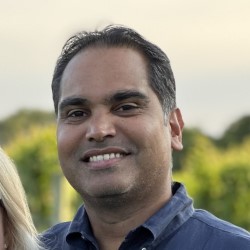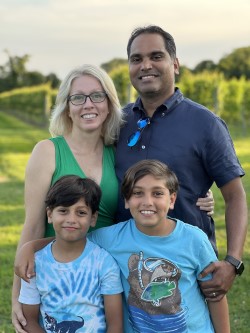
Joseph P. Mathew, MD, FACP, FCCP
Chair of Medical Specialties for Valley Medical Group, Valley Health System, New Jersey
Clinical Professor of Medicine, Icahn School of Medicine, Mount Sinai, New York City
— MEDICAL SCHOOL —
St. George's University School of Medicine, Grenada, West Indies
— INTERNAL MEDICINE RESIDENCY —
St. Luke's-Roosevelt Hospital (Mount Sinai Morningside-West), New York City
What is your current position?
I am the Chair of Medical Specialties for Valley Medical Group, Valley Health System in New Jersey, and Clinical Professor of Medicine at the Icahn School of Medicine at Mount Sinai in New York.
Where did you attend medical school and postgraduate training?
I attended St. George’s University School of Medicine in the beautiful island of Grenada, West Indies, where I spent the first two preclinical years. It was among the best two years of my life, where I had the opportunity to focus on studying medicine while interacting with students from all over the globe. I completed all of my clinical rotations in Brooklyn and Manhattan, where I was able to get a diverse clinical experience. I completed my internal medicine residency and chief residency at St. Luke’s-Roosevelt Hospital (Mount Sinai Morningside-West) in New York City.
Residency was also a wonderful experience where I was able to get a lot of hands-on training and exposure to a wide range of pathology. Chief residency prepared me for a career in teaching and administration. After residency, I pursued my fellowship training in pulmonary diseases and critical care medicine at Beth Israel Medical Center (Mount Sinai Beth Israel) in New York. This too was an exhilarating experience, surrounded by wonderful co-fellows and faculty, which made 3 rigorous years of training fly by.
Why did you choose to become a physician?
I was inspired to become a physician after my own experience as a patient while in high school. I saw firsthand the impact of physicians diagnosing and treating my illness and then coming up with a long-term treatment plan. I knew I wanted to help others like I was helped by my physicians and health care team.
What field of internal medicine did you select and why?
Picking a specialty within internal medicine was very tough, and I recall really struggling with this decision because I loved all of the specialties within internal medicine. Ultimately, I chose pulmonary and critical care medicine as I saw it as an extension of internal medicine, where one would have to be well versed in all of the different specialties. Additionally, many of my role models were in this specialty and I saw myself walking the same path.

Please describe a typical day in your practice.
My days vary depending on the rotation that I am on and my administrative duties. A typical day in the ICU would start with prerounding on some of my patients, especially the sicker ones and those on ventilator support. I get a rough idea of who we will be able to extubate and who we will be able to transfer out of the ICU. After a “huddle” with the interdisciplinary ICU team to review the general plan for the day, formal rounds occur where we review each patient in a systematic way and address all of the various organ derangements. This is usually my favorite part as we do a lot of teaching on rounds and brainstorm as a team to come up with the right treatment plan. After rounds, we often do procedures and also conduct family meetings. As I am involved in various administrative roles, when I am not on clinical service, I attend many operational and strategic planning meetings, which allows me to influence care delivery within my institution and in our neighboring communities.
What are some of your special interests professionally?
My overarching interests are in education and in improving health care quality and safety. I have utilized health care simulation to marry the two areas as they are heavily interlinked. I first became involved in simulation during my chief residency year and since then have utilized it to improve the confidence and competency of both house staff and attending physicians in various areas such as central line and other procedures, airway management, team training, crisis resource management, and addressing unconscious bias and racism within medicine. Point-of-care ultrasonography (POCUS), which I am very passionate about, is my other area of interest. I see it as an extension of my physical exam, as I am able to “look” inside my patients and obtain quick diagnostic answers. I was lucky to obtain a solid foundation in POCUS during my fellowship training and had the privilege to serve as course faculty at regional and international ultrasound courses, when POCUS was relatively new within internal medicine. Since then, I have been able to pass along this knowledge to many trainees and colleagues.

What are your interests and hobbies outside of medicine?
I love spending time with my family. Both of my children, Evan (age 10) and Aaron (age 7), are avid sports players and I enjoy attending their games and practices. Some of their games are more exciting than watching professional sports! Watching them develop and learn various life lessons from sports is a great joy.
What advice would you like to share with medical students or what do you wish someone would have told you while you were in medical school?
It took me some time to understand that medicine is really a team sport, where each member of the health care team plays a vital role in the recovery of the patient. The physician is the quarterback of the team and has to learn how to lead and coordinate the entire team. I encourage medical students to focus on interprofessional team training and also leadership training as adjunct learning to their required medical school coursework.
Which living person do you most admire?
Barack Obama. If you haven't read Dreams from My Father, check it out.
If you could change one thing about yourself, what would it be?
Smile more. I am generally a happy person but can certainly smile more to spread happiness.
What do you consider your greatest achievement?
I am proud to be one of the many health care workers who served our patients and my hometown, New York City, during the COVID-19 pandemic.
What is your motto?
“Be useful to others.” My father used to tell me this all the time while I was growing up.
Back to the December 2023 issue of ACP IMpact
More I.M. Internal Medicine Profiles

